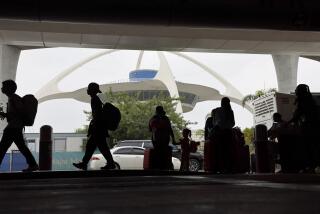Airports Warn of Holiday Delays
- Share via
As airstrikes against Iraq continue, officials at Los Angeles International and other major airports across the country are urging passengers to arrive early and expect closer screening during the busy Christmas travel period.
At LAX, acting Airport Police Chief John Bangs said federal officials have called for “enhanced vigilance” but have not ordered a security alert.
At John Wayne Airport in Orange County, however, no increased security has been ordered. “We have not received any notices requiring heightened security levels,” Kathleen Campini Chambers said. “We are continuing to operate under the same level of security that we have for some time.”
Additional uniformed police and bomb-sniffing dogs will be deployed at airport terminals in Los Angeles and across the country, airport officials said. There also is heightened concern about vehicles left unattended outside terminals, as well as unattended luggage and packages.
As the Christmas holiday draws near, airport officials expect long lines at ticket counters and delays at security checkpoints. Officials recommend that LAX passengers arrive two hours before domestic flights and three hours before international flights.
“We’re gearing up for the crush that is coming,” Bangs said Thursday.
Passengers were advised that wrapped Christmas presents may be unwrapped and opened for inspection, LAX spokeswoman Cora Fossett said. Any toy resembling a gun, hand grenade, knife or sword should not be placed in carry-on baggage.
Travelers with such electronic equipment as laptop computers, cellular phones and pagers will be, as is now customary, required to turn them on, slowing the movement at security checkpoints.
In a pointed warning, Fossett said passengers are cautioned not to make jokes about bombs or guns while at the airport.
“These jokes will be taken seriously,” she said, and could lead to arrest and fines.
At San Francisco International Airport, heightened security was ordered within 15 minutes after the U.S. and Britain began their attack on Iraq on Wednesday, airport spokesman Ron Wilson said.
Tow trucks were stationed at the airport to immediately remove unattended vehicles, and increased dog patrols were ordered. Airport personnel were told to “be on the lookout for anything unusual” or suspicious, Wilson said, including unattended luggage.
At New York’s John F. Kennedy International Airport, security was increased several days ago, but most of the precautions will not be visible to passengers.
“We will do everything and anything to not make people aware of any changes in security because that would just add to their anxiety,” said Els Langeslag, spokeswoman for JFK’s international terminal.
United Airlines spokesman Joe Hopkins in Chicago said passengers should also be aware of tighter restrictions on the size and number of carry-on bags. Stainless steel plates have been installed on X-ray machines at LAX to prevent large bags from passing through screening devices and being carried on planes.
Compared to the five-day Thanksgiving travel period, Hopkins said the two-week-long Christmas-New Year’s holiday promises to have “some very busy days. Passenger traffic is up for the whole year.”
Business at many San Fernando Valley travel agencies continued as usual Thursday, despite the troubles in the Mideast.
“There is a lot of complacency. Everybody assumes it will be over in a couple of days,” said Steve Rockow, owner-manager of Airtours Cruises and Travel Service in Encino.
“There was a lot of apprehension during the Gulf War, but I’m not seeing that happen this time,” said Rockow, a travel agent for 30 years.
He said the only change was a bulletin issued Thursday morning by TWA waiving restrictions on tickets to Tel Aviv, Cairo and Riyadh, Saudi Arabia. Typically, tickets to those destinations are nonrefundable or carry stiff penalties if canceled or rescheduled, Rockow said.
However, the airline lifted the restrictions for departures scheduled between Dec. 16 through the end of the year. By late Thursday, travel agents said other international airlines had not followed TWA’s lead.
Times staff writers Martha Willman and David Haldane contributed to this report.
* O.C. RALLIES: The debate over impeachment spilled into the streets as both sides aired their views. B3
(BEGIN TEXT OF INFOBOX / INFOGRAPHIC)
Heightened Security
Amid ongoing strikes against Iraq, the Federal Aviation Administration has advised airport officials to increase their vigilance about security measures as the busy holiday travel period begins. Officials constantly struggle with how much security is enough. Among the measures generally in use at international airports in the United States:
SECURITY MEASURES
(1) Vehicles: Unattended cars at curbs are towed immediately.
(2) Barriers: Concrete planters and other barriers are used to deter truck bombers.
(3) ID: Photo identification is required at check-in.
(4) Bags: “Passenger-bag matching system” matches bags placed aboard planes to a passenger (under the theory that most bombers do not want to be on a flight with their bomb).
(5) X-ray: Carry-on bags and luggage are X-rayed; suspicious bags hand-checked.
(6) Surveillance: Surveillance systems keep unauthorized people from approaching aircraft.
(7) Suspicious items: Passengers are alerted against accepting gifts from strangers or leaving bags unattended.
****
SECURITY LEVELS
There are four levels of security at U.S. airports, a system developed after the 1991 Persian Gulf War. 1. Baseline, lowest level of security
2. Moderate security measures, stepped-up patrols
3. Heightened surveillance, police patrols.
4. Highest level; curbside check-in is not allowed; access to gates is limited to ticketed passengers and personnel/staff with security clearance.
****
WHAT TO EXPECT AT LAX
Travelers should arrive early: LAX officials suggest two hours before domestic flights and three hours before international departures. Look for increased presence of uniformed police and bomb-sniffing canine units.
Electronic devices such as laptop computers and cellular phones will have to be turned on at security checkpoints. Wrapped packages may have to be opened for inspection.
Sources: Times staff and wire reports
More to Read
Sign up for Essential California
The most important California stories and recommendations in your inbox every morning.
You may occasionally receive promotional content from the Los Angeles Times.













